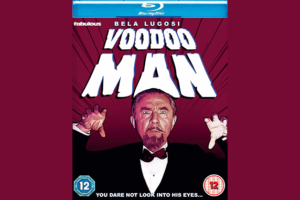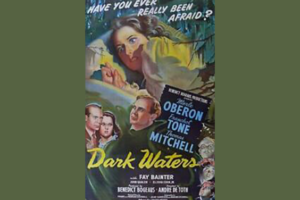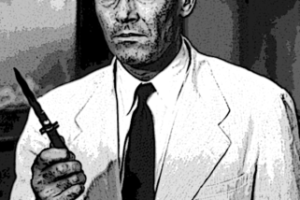
Takes no nerve to do something, ain’t nothin’ else you can do.
Today on the Classic Movie Review Podcast, we are taking on the wonderful movie The Grapes of Wrath (1940). Of course, the film is based on the John Steinbeck book of the same name that was published in 1939. It is the story of a family of Oklahoma sharecroppers that were forced off the land and traveled to California looking for new opportunities. “The Grapes of Wrath” novel was awarded the Pulitzer prize in 1940.
The movie follows the book for about half the story and then veers off and has a much softer ending. The movie has a good 8.0 rating on iMDB.com[1] and 100 percent on the Tomatometer and 88 percent audience rating on rottentomatoes.com[2].
The movie won Oscars for Best Actress in a Supporting Role, Jane Darwell as Ma Joad, and Best Director, John Ford. The film was nominated for five more Oscars but did not win in these categories: Best Picture, Best Actor in a Leading Role, Henry Fonda as Tom Joad, Best Writing, Screenplay, Nunnally Johnson, Best Sound, Recording Edmund H. Hansen, and Best Film Editing, Robert L. Simpson[3].
New York Times film critic Bosley Crowther placed The Grapes of Wrath 1940 as one of the top 50 films, worldwide, ever made.
The book and the film have often been painted with a red brush implying that it supported a Communist take over of the United States. The film director, John Ford, and the producer, Darryl F. Zanuck, were staunch conservatives and hardcore capitalists. This did not prevent the unamerican House Unamerican Activities Committee (HUAC) from investigating them concerning this film.
The title of the book and film comes from the song, “The Battle Hymn of the Republic,”
Mine eyes have seen the glory of the coming of the Lord:
He is trampling out the vintage where the grapes of wrath are stored;
He hath loosed the fateful lightning of His terrible swift sword
The phrasing is also tied to the Biblical book of Revelations. The essence of the phrasing is that one day, the Lord will return and extract retribution on those that have caused suffering to his followers. It can also be implied that the people will rise up, with the righteous blessing of the Lord and overthrow their oppressors. Close to the end of the book, Steinbeck writes “..in the eyes of the hungry there is a growing wrath. In the souls of the people the grapes of wrath are filling and growing heavy, growing heavy for the vintage.” So this could be seen as a very frightening idea, depending on where you were in the social structure.
Actors – The Grapes of Wrath (1940)
Returning
Henry Fonda was in the role of Tom Joad, a fair man forced to take leadership within his family. Fonda was first covered in In Harm’s Way (1965).
The always great John Carradine played former preacher Jim Casy. Carradine was first covered in the horrible Billy the Kid Versus Dracula (1966).
Russell Simpson was cast as Pa Joad. Simpson was covered in The Petrified Forest (1936).
Others include John Qualen as Muley Bates first covered in The Man Who Shot Liberty Valence (1962), Ward Bond as an Oakie Policeman who was covered as Bert the cop in It’s A Wonderful Life (1946), Frank Faylen as Tim and he was covered in 99 River Street (1953), and Pat Flaherty as an uncredited Deputy and he was first covered in Key Largo (1948).
New
Jane Darwell was great in the role of Ma Joad. Darwell was born in 1879 in Missouri. Dang. They had just stopped shooting. Darwell wanted to be an opera singer but her father disapproved. She started working on stage later in life at the age of 33. She was almost 40 when she began making silent shorts in 1913. Her first full length was Brewster’s Millions (1914) which was remade in 1945 and in 1985 with Richard Pryor.
Darwell made six films with John Ford and called Henry Fonda son, because she had played his mother so many times. These films are The Grapes of Wrath 1940 for which she received the Best Supporting Actress Oscar, My Darling Clementine (1946), 3 Godfathers (1948), Wagon Master (1950), The Sun Shines Bright (1953), and The Last Hurrah (1958).
With over 200 films and television credits, her other great movies include Gone with the Wind (1939), The Devil and Daniel Webster (1941), The Ox-Bow Incident (1942), and Caged (1950). In 1959, Darwell retired to Motion Picture Country Home. At the urging of Walt Disney, she agreed to appear in one more film, Mary Poppins (1964). Darwell died in 1967.
Pre-Story Notes
Many farmers on the Great Plains were not using soil-sustaining farming practices. In 1934, 1936, and 1939-1940, great storms of windblown soil began to blanket the panhandles of Texas and Oklahoma, as well as parts of Kansas, Colorado, and New Mexico[4], known commonly as The Dust Bowl. This statically charged cloud penetrated the smallest gaps in machinery and made growing crops impossible.
The Great Depression began in September 1929 and essentially lasted until the US entered World War II. There were federal programs, such as the Federal Theater Project, that kept some people going. By 1930, almost 25 percent of the US population was unemployed.
So set during the Dust Bowl and the Great Depression, the story begins.
Tom Joad (Henry Fonda) is walking through the desolate Oklahoma farmlands. The first time he is seen, he is at a crossroads. At a small diner, Tom badgers a truck driver into giving him a lift. Tom says he is heading back to the family’s share-cropping farm. The driver talks to Tom about the palms of his hands being shinny. Tom is a grouchy guy and has been in the penitentiary for four years swinging a pick. When he gets out, he tells the driver he was in for homicide.
Story – The Grapes of Wrath (1940)
Tom walks down the road to his farm and runs into former preacher Jim Casy (John Carradine). Casy says he is not sure about things anymore and he doesn’t have anything left to preach. Casy had a thing for the girls following his sermons. Tom tells Casy he was in the pen. He said he killed a man at a dancehall after the guy stabbed him. The two pair up and head to the farm.
They make it to the house, and the wind is blowing the soil hard. Like the Oakies being blown out of Oklahoma. Inside the house it is dark and no one is around. Tom looks through clothing that has been left behind and thinks they may all be dead. They hear a creak and find Muley Bates (John Qualen) using the abandoned house for shelter. Muley tells Tom that all of the families have been forced off their land and Tom’s family was at his uncle’s getting ready to go to California. Muley flashbacks to when he got his eviction notice. The Dust Bowl has made the share-cropping system unprofitable for the landowners, and it would be cheaper for them to hire a man with a tractor. The sharecroppers don’t understand because they consider the land theirs having farmed it for 50-70 years.
Muley remembers that an army of Caterpillar tractors came to bulldozer the house and chase the families away. Muley gets ready to shoot the tractor driver, but the driver says they will just send another driver to do the job. The long shadows of the farmers are shown crossing the tracks left by the tractor. Muley sees lights and says they have to run before the land superintendent finds them. They hide in the fields.
In the morning, Casy and Tom head to Uncle John’s farm.
At the farm, Pa Joad (Russell Simpson), Ma Joad (Jane Darwell), Grandpa (Charley Grapewin), Grandma (Zeffie Tilbury), Uncle John (Frank Darien), Noah (Frank Sully), Ruthie (Shirley Mills), and Winfield (Darryl Hickman). As they eat, and Ma works, they talk about what they will do when they get to California.
Ma sees Tom and Casy in the yard. She checks to make sure Tom didn’t bust out of prison. There are handbills being circulated that say there are high-paying jobs in California. The family is happy to see Tom back. A flatbed truck, which was a 1926 Hudson “Super Six” passenger car that was converted for the movie[5], was driven by Al (O.Z. Whitehead) and carrying Rosasharn (Dorris Bowdon) and her husband Connie (Eddie Quillan). Rosasharn is about 6-months pregnant. The happy reunion is broken up when two men in a nice car arrive and tell Uncle John that they have to be off the land by the morning.
Before the sun comes up in the morning, they are loading the truck. They have around $150 for the trip. Ma is taking it very hard as she burns papers and other things that she won’t be taking on the trip. I think “The Old Rugged Cross” is the background music.
They load the truck, but Grandpa is missing. Grandpa has decided he is not going to make the trip. They are trying to figure out how to get him on the truck. Finally, Ma gets some patent medicine and doses him. They all, including Casy, load onto the truck. The winds blow on the abandoned house as they leave.
The Joad’s are part of a migrant caravan heading west partially on Route 66. Cars were paid $5 a day to ride with the Joad truck to make it seem like there was a lot of movement.
At the end of the day, they stop by the roadside to camp. Grandpa is still freaking out. He grabs a handful of soil and then dies. They bury him by the roadside and leave a note in a jar saying he died of natural causes. Casy reluctantly agrees to pray over the grave. Casy prays for the living and not the dead.
They continue their westward journey into the desert lands, and one night they find a ‘pay to stay’ campsite. They met others that have been forced out by the Great Depression and the Dust Bowl. They are depending on getting good jobs in California. One man laughs because he has been to California and there ain’t good jobs to had and that the handbills have been overprinted. The man talking has lost his whole family from starvation in California. Casy and Tom know the man is telling the truth. They have no choice but to continue on to California.
They cross the Pecos River into New Mexico and stop their smoking heap at a gas station. The owner wants to know if they have money to pay for gas. Pa Joad goes in to buy bread for Grandma. The cook makes the waitress sell him the bread. Ruthie and Winfield see some candy, and the waitress that has been hard about the bread gives them the candy at a low price. The truckers in the place drop a couple of silver dollars on the waitress for her good deed.
At the border of Arizona, they have to go through an agriculture inspection station. It is very clear that they are not welcome. The truck passes through the reservation where Hopi Indians are living a more traditional lifestyle. They stop at the Colorado River and look into California. Pa Joad refers to it as the Biblical land of milk and honey invoking Moses looking to the promised land but never being allowed to enter. Grandma is over it already. The overloaded truck pops a wheedle as they start again. They find a place and swim/bath in the river.
The Joad’s prepare to cross the California desert at night. As they water up the truck the station attendant says that it takes a lot of nerve to try and cross the desert in that truck. Tom says, “Takes no nerve to do something, ain’t nothin’ else you can do.” Grandma is getting sick as they get ready to make the crossing. After the Joad’s put out, one of the attendants says that the Oakie aren’t human because of the way they live. Hum?
Ma tends to Grandma and Ma’s intent that the family gets across. Connie is regretting the way his life has worked out. On the other side of the desert, there is another agricultural inspection station. They want them to unload everything off the truck. Ma swears that Grandma is sick, and they have no fruit or vegetables. The cop lets them pass without unloading.
Before they make the 8-miles into Barstow, they have to push the truck up the hill. At the peak, they see green fields on the other side. Tom goes to get Ma, and she tells him that Grandma died the night before the inspection. Ma said she had to make sure the family made it through.
When they push the, out of gas, truck into a gas station, they are set upon by a hostile cop (Ward Bond). The cop tells them that all of the picking work has moved south. When he finds out that they came from the same area of Oklahoma, he gives them the advice to move through town and go to the camp. He also says the real criminal is the guy that made the flyers.
When they get to the camp, it is a ramshackle assortment of sheds, families, and cars. It looks like a Dorothea Lange[6] mural. Everywhere in the camps are slack-bellied scarecrow children hunting like dogs for a bite to eat. One crying girl says that all anyone is eating is fried dough. Ma is sick that she can’t feed the kids. There is barely enough for her family. Tom finally runs the kids off. Casy has quietly slipped away. Ma tells them to get a flat stick, and she will feed them what is left.
Later a man in a suit and a deputy in a convertible come and says there is work. He won’t tell them what the pay rate is going to be. One man starts asking to see his license and asks for a contract. He says that twice he has been fooled and they overbook and pay half rate. They say the man is an agitator. They order the speaker into the car. Tom speaks up for him. When the deputy comes after the man, he hits him and runs away. The deputy fires wildly hitting an old woman. Tom and Casy gang tackles the deputy. Casy gets rid of the gun and tells Tom to hide in the willows. Four more deputies come in. Casy takes the wrap for both assaults to the deputy. The lady slowly bleeds to death.
In the morning, Tom sneaks back into camp. He says that the people down at the willows have heard that the townsfolks are coming to burn the camp out. He wants to leave right away. Ma says that Connie ran out on his pregnant wife. Rosasharn is pretty broken up.
It is late by the time they get packed and ready to leave. The rest of the camp is fleeing as well. Tom is angry and wants to attack. Ma is trying to convince him that he needs to stay with the family.
They are met by a mob on the highway. They say they are not welcome, and they have to turn the truck around. Ma keeps Tom from fighting back. On the way north, they have to stop to repair another tire. Another man in a suit driving a convertible comes by and tells them that there is work 40-miles north. When they get to the farm, there are lines of families waiting to get in. The state police are out on nice Indian motorcycles.
They pull up to the checkpoint and are checked by badged deputies. A man on the side of the road yells that they are scabs. They are roughly ushered into a row house near a farm store by more badged deputies. They agree that everyone will work and get five cents a box. Their tag number and other information are collected (Data are plural). Tom is very suspicious of the rough treatment. They are given picking buckets, and everybody goes to work except Ma and Rosasharn.
At supper that night, Ma says it took the whole day’s wages to buy not enough meat to feed the family because the store charges higher prices. Tom goes to find out what’s going on. He is turned back by another armed badged man. He slips out the back way.
Some tents are set up by the river and Tom goes down. Casy is one of the men that is living in the squatter’s camp. Casy tells them that they are on strike because the farm lowered their rate from five cents to two and a half cents. The strikers think that the peaches are ripe and soon the farm will have to pay a higher rate as long as the strike continues.
The fake deputies attack the river camp. Tom and the strikers flee down the river but are spotted by the goons. The goons club and kill Casy. Tom takes a club and kills one of the goons. But Tom is hit across the face and now has an identifying wound. Tom makes it back to the shack, but he has to hide.
Tom tells his Ma that he is going to leave. She talks about when they had land, the family was held together as the old died and the young came. Ma begs him to stay. She also hears that they are paying two and a half cents per crate. That night they pack to leave. They hide Tom and make it out without the goons catching him.
The old truck overheats, and they coast into a Department of Agriculture farmworkers’ camp. The camp is run by a good civil servant. The camp is clean and decent and run by a committee. The Joad’s are very suspicious because this is the first time they have been treated decently. It’s a socialist paradise. In this camp, the children are fed and playing. The Joad children see indoor plumbing for the first time.
Tom gets work laying a pipe next to a watermelon patch. He is with one of the camp commissioners (Frank Faylen). The owner of the patch tells the men to expect trouble at Saturday’s dance as they are being called Reds and agitators. Tom doesn’t even know what a Red is.
The camp men are prepared for trouble at the dance. A group of single men come in and are spotted as troublemakers. Armed deputies are waiting to raid the camp as soon as the other men start a fight. The troublemakers walk onto the dance floor. At 9:29 the deputies head for the camp. The troublemakers begin to start a fight. Tom and other men from the camp grab the troublemakers and usher the bad men away. The camp administrator won’t let the deputies in without a warrant.
Late one night, two deputies come in with the administrator. They check the Joad’s truck tag and say they will be back with an arrest warrant. Tom has been awakened by their lights and gets ready to leave. While he is packing, Ma wakes up and asks if he is going to say goodbye. They go outside to talk. Tom says he looks forward to Ma and the family getting settled. Tom says he is going to take up the work of Casy. He will look for the wealth problem and try to figure it out. Ma asks how she will know what becomes of him. Tom says:
I’ll be all around in the dark – I’ll be everywhere. Wherever you can look – wherever there’s a fight, so hungry people can eat, I’ll be there. Wherever there’s a cop beatin’ up a guy, I’ll be there. I’ll be in the way guys yell when they’re mad. I’ll be in the way kids laugh when they’re hungry, and they know supper’s ready, and when the people are eatin’ the stuff they raise and livin’ in the houses they build – I’ll be there, too.
But Bruce Springsteen said it best as:
Now Tom said, “Mom, wherever there’s a cop beating a guy
Wherever a hungry newborn baby cries
Where there’s a fight against the blood and hatred in the air
Look for me, Mom, I’ll be there
Wherever somebody’s fighting for a place to stand
Or a decent job or a helping hand
Wherever somebody’s struggling to be free
Look in their eyes, Ma, and you’ll see me.”[7]
Ma Joad does not understand. They say goodbye and wish that he will come back one day. Tom leaves across the dance floor. Ma is alone with what is left of the family. Tom is walking on a lone ridge. The Old Rugged Cross plays.
Ma and Pa head the family out for 20-days work in Fresno. Ma cries about leaving the first decent place she has been at in a while. A caravan of trucks and families head down the road. Ma says there may be work and maybe not. Ma says she was scared, but she is not and never will be again. Pa tells how Ma keeps the family together. She says men live in jerks, like a marriage, a death, buying a farm, but women live their lives like a river flows, with no beginning or end. She says the people will go on forever and can’t be beaten.
I’ll be right back after this word from our sponsors with conclusions and the World-Famous Short Summary.
Summary
The Cliff Notes lays out a theory that Casy is a Christ-like figure. Tom found him wandering in the wilderness [8]. His initials are J.C. He sacrificed himself to save Tom from the deputy, and he later gave his life at the hands of agents of the power structure.
To this I add, that by my count 13 people began the trip; Tom Joad, Ma Joad, Jim Casy, Rosasharn, Pa Joad, Al, Connie, Grandma, Noah, Uncle John, Winfield, Ruthie, and Grandpa. If you accept Casy as representing Jesus, it is easy to place the other twelve as the disciples with Tom in the role of Peter. Noah, Grandma, and Grandpa never made it to the promised land of California, like Moses never made it into to promised land of Canaan. Connie ran away and left the family, so he can be shoehorned into the Judas role.
In the book, Rosasharn’s baby was stillborn. She used her milk to save an old man. The movie went with a more upbeat ending. Tom goes to fight for justice, and Ma Joad is the glue that holds the family together.
World-Famous Short Summary – ‘Tween government and people, stands the right arm of the law – Billy Bragg
Beware the moors
[1] https://www.imdb.com/title/tt0032551/
[2] https://www.rottentomatoes.com/m/grapes_of_wrath
[3] https://www.imdb.com/title/tt0032551/awards
[4] https://en.wikipedia.org/wiki/Dust_Bowl
[5] https://www.oldcarsweekly.com/features/grapes_of_wrath_hudson_part_of_film_history
[6] Dorothea Lange Migrant Mother
[7] https://en.wikipedia.org/wiki/The_Ghost_of_Tom_Joad_(song)
[8] https://www.cliffsnotes.com/literature/g/the-grapes-of-wrath/character-analysis/jim-casy










Leave a Reply
Your email is safe with us.